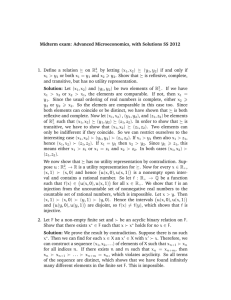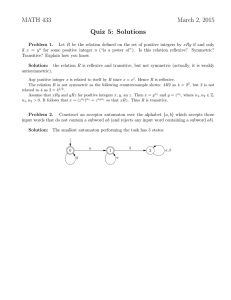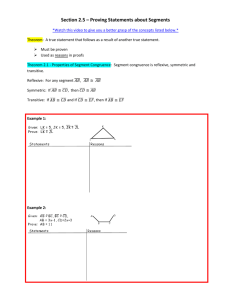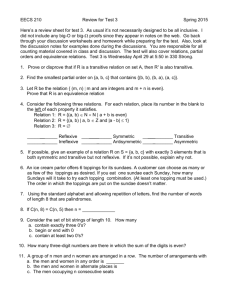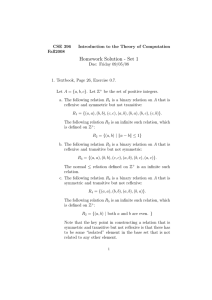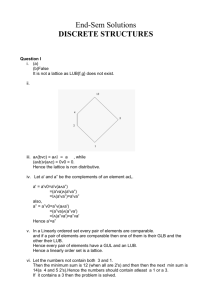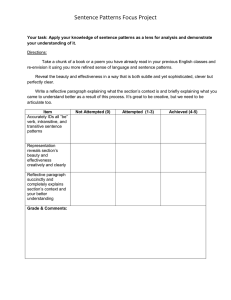Document 10813086
advertisement
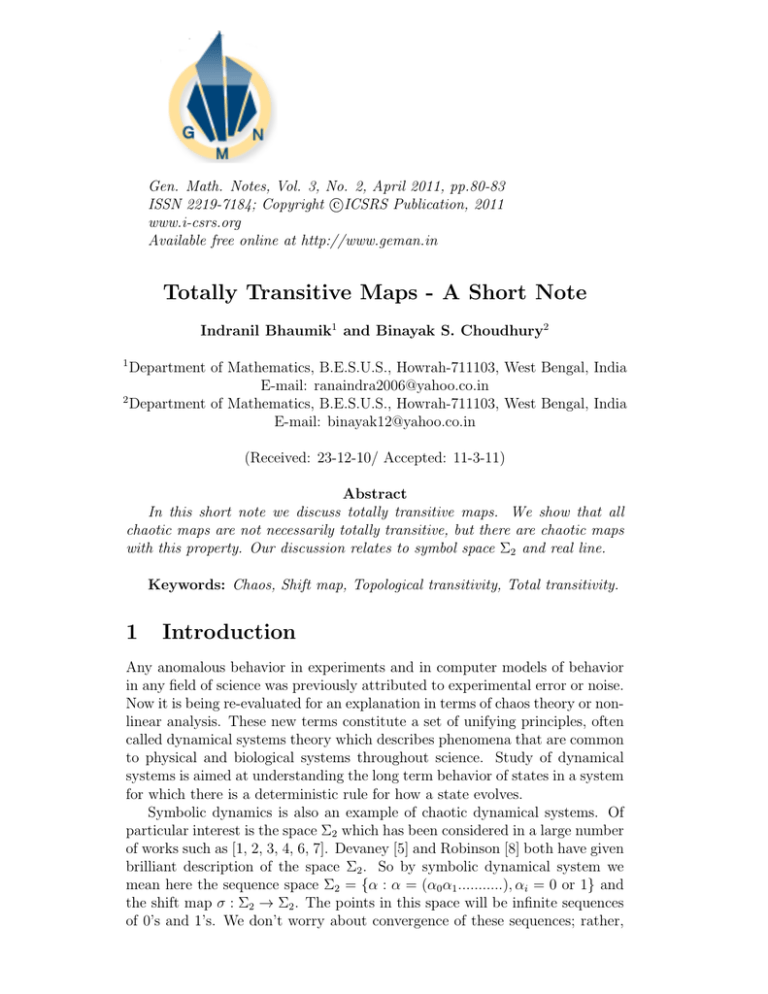
Gen. Math. Notes, Vol. 3, No. 2, April 2011, pp.80-83
c
ISSN 2219-7184; Copyright ICSRS
Publication, 2011
www.i-csrs.org
Available free online at http://www.geman.in
Totally Transitive Maps - A Short Note
Indranil Bhaumik1 and Binayak S. Choudhury2
1
Department of Mathematics, B.E.S.U.S., Howrah-711103, West Bengal, India
E-mail: ranaindra2006@yahoo.co.in
2
Department of Mathematics, B.E.S.U.S., Howrah-711103, West Bengal, India
E-mail: binayak12@yahoo.co.in
(Received: 23-12-10/ Accepted: 11-3-11)
Abstract
In this short note we discuss totally transitive maps. We show that all
chaotic maps are not necessarily totally transitive, but there are chaotic maps
with this property. Our discussion relates to symbol space Σ2 and real line.
Keywords: Chaos, Shift map, Topological transitivity, Total transitivity.
1
Introduction
Any anomalous behavior in experiments and in computer models of behavior
in any field of science was previously attributed to experimental error or noise.
Now it is being re-evaluated for an explanation in terms of chaos theory or nonlinear analysis. These new terms constitute a set of unifying principles, often
called dynamical systems theory which describes phenomena that are common
to physical and biological systems throughout science. Study of dynamical
systems is aimed at understanding the long term behavior of states in a system
for which there is a deterministic rule for how a state evolves.
Symbolic dynamics is also an example of chaotic dynamical systems. Of
particular interest is the space Σ2 which has been considered in a large number
of works such as [1, 2, 3, 4, 6, 7]. Devaney [5] and Robinson [8] both have given
brilliant description of the space Σ2 . So by symbolic dynamical system we
mean here the sequence space Σ2 = {α : α = (α0 α1 ...........), αi = 0 or 1} and
the shift map σ : Σ2 → Σ2 . The points in this space will be infinite sequences
of 0’s and 1’s. We don’t worry about convergence of these sequences; rather,
Totally Transitive Maps - A short Note
81
the difficult notion here is to imagine such an infinite sequence as representing
a single ‘point’ space. Also Σ2 is a compact metric space by the metric
d(s, t) =
∞
X
|si − ti |
, where s = (s0 s1 .........) and t = (t0 t1 ..........) are any two
2i+1
i=0
points of Σ2 .
We now give some definitions and lemma which are required for this note.
Definition 2.1. (Shift map [5]) The shift map σ : Σ2 → Σ2 is defined by
σ(α0 α1 ..........) = (α1 α2 .........), where α = (α0 α1 ...........) is any point of Σ2 .
Definition 2.2. (Topologically transitive [5]) A continuous map f : X → X is
called topologically transitive if for any pair of non-empty open sets U, V ⊂ X
there exists k ≥ 0 such that f k (U ) ∩ V 6= φ, where (X, ρ) is a compact metric
space.
Definition 2.3. (Totally transitive [9]) Let (X, ρ) be a compact metric space.
A continuous map f : X → X is called totally transitive if f n is topologically
transitive for all n ≥ 1.
We also require the following lemma.
Lemma 2.1. [5] Let s, t ∈ Σ2 and si = ti , for i = 0, 1, ........, m. Then
d(s, t) < 21m and conversely if d(s, t) < 21m , si = ti , for i = 0, 1, ......, m.
In this short note we consider a particular property of the dynamical
system, namely, the total transitivity. Here we show that the chaotic map
may or may not satisfy this property. We get that the shift map is totally
transitive but in intervals the situation is different.
2
The Main Result
Theorem 2.1 The shift map σ : Σ2 → Σ2 is totally transitive on Σ2 .
Proof. Let U and V be two non-empty open subsets of Σ2 and ε1 , ε2 > 0.
Also let s = (s0 s1 ...................) ∈ U be a point such that min{d(s, β)} ≥ ε1 , for
any β belongs to the boundary of U . Similarly, let t = (t0 t1 ....................) ∈ V
be any point such that min{d(t, γ)} ≥ ε2 , for any γ belongs to the boundary
1
of V . Next we choose k1 and k2 so large that 2nk11 −1 < ε1 and 2nk
< ε2 ,
2
where n is any arbitrary positive integer. We now consider the point α =
(s0 s1 ........snk1 −1 t0 t1 ........tnk2 .......). Then by Lemma 2.1, d(s, α) < 2nk11 −1 < ε1 .
82
Indranil Bhaumik et al.
Hence α ∈ U , that is, (σ n )k1 (α) ∈ (σ n )k1 (U ).
On the other hand, (σ n )k1 (α) = (t0 t1 ...........tnk2 ............).
1
Hence d((σ n )k1 (α), t) < 2nk
< ε2 , by applying Lemma 2.1 again. This
2
n k1
gives (σ ) (α) ∈ V .
So we get that (σ n )k1 (U ) ∩ V 6= φ.
Hence the shift map σ : Σ2 → Σ2 is totally transitive on Σ2 .
A question now arises that, is all topologically transitive maps are totally
transitive? The following example gives a suitable answer to this question.
Example 2.1. Let f (x) be a continuous map from [0, 1] onto itself defined by
f (x) =
3x + 25 , 0 ≤ x ≤
8
1
1
5
2
−3x + 5 , 5 ≤ x ≤ 5
2x − 2, 2 ≤ x ≤ 1
3
3
5
It can be easily proved that the function f is topologically transitive on
[0,1] and hence it is chaotic by the result of Vellekoop [10]. On the other hand
it is not totally transitive, since the subintervals [0, 25 ] and [ 25 , 1] are invariant
under f 2 , so f 2 is not topologically transitive on [0,1].
3
Conclusions
In this short note we have given an example of an interval map which is topologically transitive but not totally transitive. But in the symbol space the
shift map is totally transitive. So we can say that although total transitivity
is a stronger property than topological transitivity, every chaotic map does
not necessarily become totally transitive. We also know that shift map σ is
topologically conjugate to the logistic map F4 (x) = 4x(1 − x) on intervals, but
there is chaotic map on the same interval which is not totally transitive. Hence
we conclude that in general not all transitive maps are totally transitive and
also not all chaotic maps are totally transitive.
Acknowledgements
Indranil Bhaumik acknowledges his father Mr. Sadhan Chandra Bhaumik
for his help in preparing the manuscript.
83
Totally Transitive Maps - A short Note
References
[1] I. Bhaumik and B.S. Choudhury, Topologically conjugate maps and ωchaos in symbol space, Int. J. Appl. Math., 23(2) (2010), 309-321.
[2] I. Bhaumik and B.S. Choudhury, Some unknown properties of symbolic
dynamics, Int. J. Appl. Math., 23(5) (2010), 941-949.
[3] I. Bhaumik and B.S. Choudhury, A new model of chaotic dynamics - the
complemented shift map, J. Phy. Sc., 14 (2010), 133-143.
[4] I. Bhaumik and B.S. Choudhury, A note on the generalized shift map,Gen.
Math. Notes, 1(2) (2010), 154-160.
[5] R.L. Devaney, An Introduction to Chaotic Dynamical Systems, (2nd Edition), Addison-Wesley, Redwood City, CA, (1989).
[6] X.C. Fu, W. Lu, P. Ashwin and J. Duan, Symbolic representations of
iterated maps, Topo. Meth. Non. Anal., 18 (2001), 119-147.
[7] W. Parry, Symbolic dynamics and transformation of the unit interval,
Tran. Amer. Math. Soc., 122(2) (1966), 368-378.
[8] C. Robinson, Dynamical Systems: Stability, Symbolic Dynamics and
Chaos, (2nd Edition), CRC Press, Boca Raton, FL., (1999).
[9] S. Ruette, Chaos for continuous
psud.fr/ruette/, December 15, (2003).
interval
maps,
www.math.u-
[10] M. Vellekoop and R. Berglund, On interval transitivity = chaos, Amer.
Math. Mon., 101(4) (1994), 353-355.
